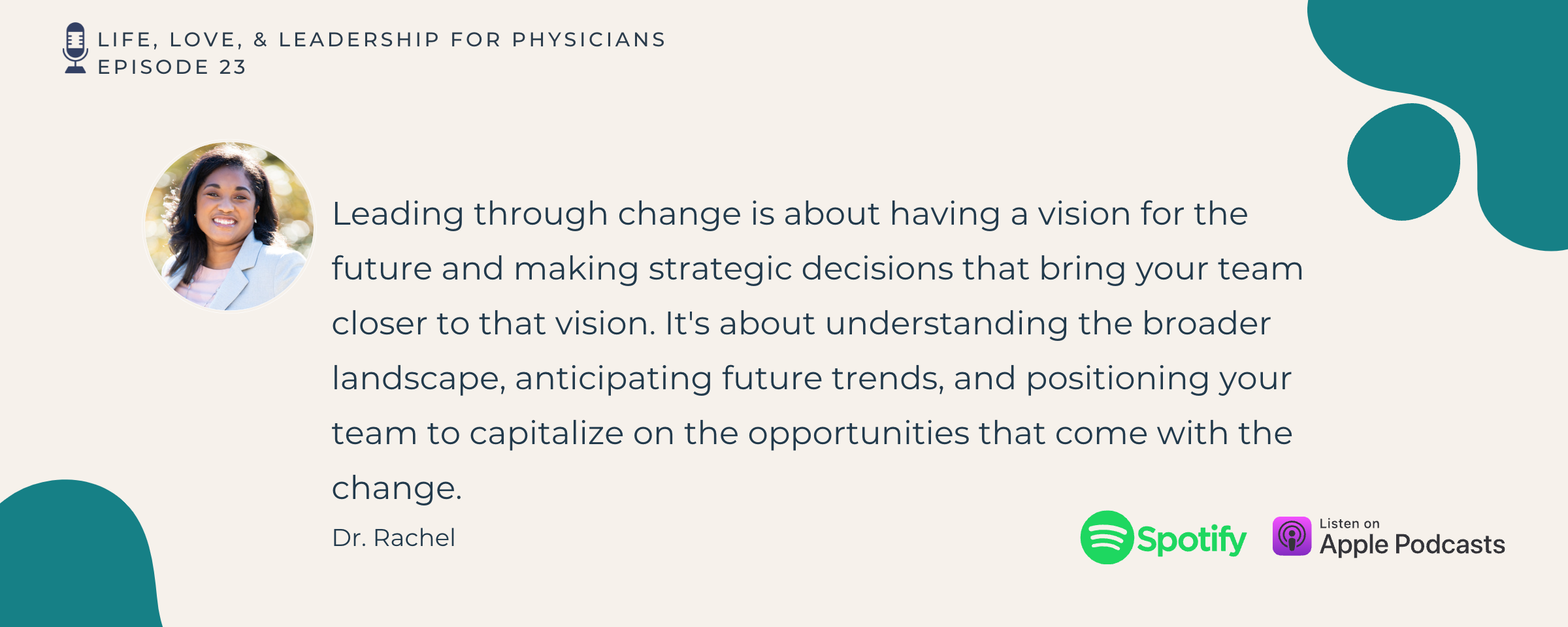The saying ‘change is the only constant in life’ is true now more than ever, especially in healthcare. Our healthcare environment has undergone significant transformations, from technological advancements to shifts in patient care approaches to facing pandemics like COVID. Change has been particularly complex and challenging lately, yet it’s necessary for growth in the healthcare industry.
But here’s the question: how do we navigate these changes, especially those of us in leadership positions? How do we guide our teams, institutions, and healthcare systems through this change? How, most importantly, do we ensure that our patients receive the best care possible amidst all these changes?
In episode 23 of the Life, Love, and Leadership for Physicians podcast, we’re diving deep into the role of physician leaders and managing change. I’ll talk about some of the skills needed to lead effectively during transition periods and the strategies and techniques you can use to successfully guide your team through these changes. Whether you’re a seasoned leader, just stepping into a leadership role, or even leadership-curious, you’ll find value in this episode.
What significant changes have we seen recently?
Telemedicine has changed the way we deliver care. Electronic health records and data-driven medicine are changing how we track patient health and help influence treatment decisions. The pandemic has altered how we approach everything from infection control to mental health support for healthcare providers.
These changes impact our industry at every level, influencing how we provide care to patients and collaborate with our colleagues, and they even shape the trajectory of our careers.
These changes can improve patient outcomes, workflow efficiency, job satisfaction, and physician retention when managed well. However, without effective leadership to navigate these changes, it can also lead to confusion, resistance, burnout, increased turnover, and, ultimately, the quality of patient care.
How do we guide our teams through these changes and challenges?
Physician leaders are uniquely positioned to spearhead change in healthcare because of our clinical expertise, understanding of the intricacies of patient care, and our strategic insight to implement change at an organizational level. However, this dual role comes with its own set of challenges.
Physicians are expected to deliver high-quality care, stay current with the latest medical research, and manage patient relationships. On the other hand, as a leader, we’re responsible for making tough decisions, effectively communicating with our team and stakeholders, and steering the organization’s direction amidst change. Balancing these roles can be challenging, but we can navigate change effectively and positively impact patient care and our organizations’ performance with the right approach.
What skills do we need to lead through change?
There are four critical skills we need to lead through change.
- Communication – Great leaders make sure everyone on the team understands what changes are happening, why they are necessary, and how they will benefit both the team and the patients.
- Emotional intelligence – Leaders with high emotional intelligence are often more successful at facilitating change because they can gauge the team morale, they’re able to navigate conflicts more effectively, and they can foster a positive working environment.
- Strategic thinking – Leading through change involves having a vision for the future and making strategic decisions that bring your team closer to that vision. It’s about understanding the broader landscape, anticipating future trends, and positioning your team to capitalize on the opportunities that come with change.
- Resilience – The ability of a leader to execute resilience is crucial. If we can optimize our resilience, especially through periods of change, we’ll connect better with our teams and improve the care of our patients.
So, how can we implement these concepts and create an effective strategy?
Listen and learn more about how to lead through change in episode 23 of the Life, Love, and Leadership for Physicians podcast.



